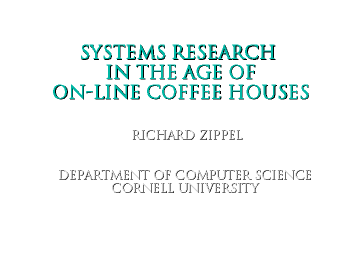
On to the next Slide or up to the Overview
Twenty or more years ago, researchers fantasized about a future populated by awsomely fast (and cheap) computers. Computers would be well connected, both to each other and to the world. They would relieve us of the drudgery in our lives like cleaning and maintaining our houses. Difficult financial decisions like purchasing cars and homes would be mediated and optimized by computers. They would make vast stores of information available in a fashion that doesn't overwhelm, but encourages further exploration. And electronic models constructed of the works of our great thinkers would allow us to study their thoughts and actions in ways hitherto unimagined. We would, in effect, be able to interact with the great minds of our time and of past times.
We were sure these machines would change our world for the better, and would make the science fiction of our fantasies no fiction. Computers would change our lives. Today computers have reached and even exceeded the performance and price levels required of our earlier fantasies and the changes they have wrought fall far short of our desires.
Richard Zippel